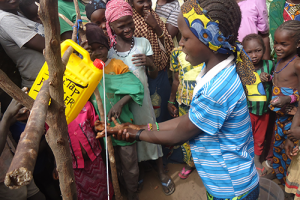
The COVID-19 pandemic has dramatically changed the world as we know it. Despite the new and imminent challenges that it presents, NCBA CLUSA’s global programs are continuing to work and educate communities. While many of our project staff are practicing social distancing and teleworking in their respective countries, priorities have shifted to ensure that communities are up-to-date on government guidelines and proper precautions to stop the spread of the coronavirus.
Dominican Republic
In the Dominican Republic, the U.S. Department of Agriculture (USDA)-funded Safe Agriculture/Food Export Program (SAFE) project is increasingly shifting focus toward community hygiene practices.
One of the World Health Organization and Center for Disease Control’s recommendations to mitigate the spread of COVID-19 is to distribute more hand-washing stations to build a culture of hygiene—especially in rural areas. We have partnered with a WASH organization Wine-to-Water (W2W) to procure and distribute 25 simple hand-washing stations in communities and are doing the requisite trainings on their use and maintenance. The hand-washing stations being distributed are very simple and cost-effective at $30 each and are produced locally, which helps inject more money into the local economy during the crisis when everything is closed.
The project has also continued to strengthen our 25 producer organizations that have received a grant to establish extension systems. We are connecting some of these producer organizations to WASH organizations like W2W. By connecting the agents with organizations such as W2W (or medical supplies distributors, the local Red Cross branches or other NGOs), the project meets some of its objectives to link producer organizations with agro-input suppliers. But instead of the project facilitating direct connections as an intermediary, it is employing private extension agents. These agents are able to provide more services to their members, increasing member confidence and ensuring greater sustainability once the project ends. The private extension agents are also better equipped to follow up with individual farmers to ensure they are properly applying the new technology or practice than the project’s staff could during the pandemic.
Mozambique
In Mozambique, NCBA CLUSA is committed to the PROMAC II project’s mission of empowering communities to address the impact of climate change on food security, promoting economic development through capacity building and market linkages, and addressing nutritional challenges by advocating for the production of diverse, nutritious crops and their consumption at the household level. COVID-19, however, has forced us to find ways to do this more remotely, reducing face-to-face contact with target groups and limiting the spread of COVID-19 by respecting the recommended social distancing guidelines.
In order to continue our work and maintain contact with farming communities during this time, we have put a plan of action in place. This plan includes:
- Provision of extension support to our Lead Farmer network via digital technologies We have suspended all trainings and face-to-face activities until further notice. Meanwhile, all project extension agents are available to provide technical assistance to our network of Lead Farmers via cellphones. We are sending farmers text messages with critical information and our extension agents are available to answer farmers’ questions and provide agronomic advice via text message, Whatsapp or a direct phone call.
- Call-in radio programs to provide information and answer farmers questions Field extension agents, local farmers and local experts discuss topics such as post-harvest handling, commercialization and horticulture production live on Radio Moçambique. These radio programs are recorded once a week and broadcasted in local languages.
- Crop development monitoring using drones The PROMAC II project will continue flying drones over designated areas to monitor crop development. While the harvest for maize has begun, soy and other legumes are still in the ground. Close monitoring of their continued development will allow us to identify any urgent issues and define specific interventions to support farmers. Again, we will use cellphones and other digital means to advise farmers accordingly.
Additionally, NCBA CLUSA staff received training on COVID-19 prevention from the Ministry of Health. All those who can work from home are doing so, and our offices are following the government restrictions, such as working in shifts.
Niger and Burkina Faso
In Niger and Burkina Faso, the U.S. Agency for International Development (USAID)-funded Resilience and Economic Growth in the Sahel (REGIS-ER) project has shifted priorities to ensure that communities are well informed and educated about the pandemic. In order to contribute to halting the spread of the coronavirus, local communities in project intervention areas are stepping in to help authorities break the chain of transmission.
REGIS-ER established Citizen Working Groups (CWG), or commune-level civil society organizations. By establishing public-private partnerships with the Municipal Council, these groups are now playing a significant role in combatting COVID-19, raising awareness and augmenting community organizing efforts. With the outbreak of cases in the country and guidance provided by the Government of Niger, the Prefect of the Department of Balleyera relied on the CWGs in the commune of Tagazar in Niger’s Tillaberi Region. Using the CWG’s WhatsApp groups and other resources, they were able to disseminate educational messages to prevent the spread of COVID 19.
Similar to the initiative in Tagazar, CWGs throughout the project intervention zones organized themselves to halt the spread of the disease through various ways, including the use of community radios to amplify their messages.


